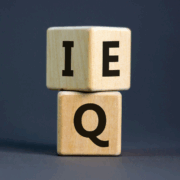Emotional intelligence (EI), also called emotional quotient (EQ), is a person’s ability to perceive, manage, understand, and use their emotions to guide thinking and behavior, especially in taxing situations. Divorce is one of the more challenging experiences a person can go through, and having emotional intelligence serves to soften the blow.
You can maintain emotional resilience in divorce by first recognizing your core emotions and any feelings that arise throughout the process. If necessary, seek guidance from a therapist to work through your emotional stress rather than bringing it into divorce negotiations. You do not want to make long-term decisions led by your temporary emotions.
Emotional intelligence also ties into conflict resolution and communication skills in divorce. By being aware of and in control of your emotional state, you can avoid heated arguments with your spouse and clearly communicate your needs without allowing emotions to take control.
Why Is Managing Emotions During Divorce Important?
Emotional intelligence in divorce is a crucial component of effective negotiation and mediation. If you are in a heightened emotional state when arguing for your rights or stating your point of view about matters like child custody, property division, or child support, you risk prolonging the process and agreeing to something you likely wouldn’t agree to under normal circumstances.
The decisions made during your divorce are either permanent or too time-consuming to alter down the road. You want to ensure that the marital settlement agreement, parenting plans, and any other agreements made during this process reflect your actual wishes. Seek to keep emotions to a minimum and make decisions rooted in logic and your actual best interests.
Emotional Intelligence With Co-Parenting and Post-Divorce Life
While having emotional intelligence in your divorce is important, EI can also help your post-divorce life. It can:
- Allow you to make level-headed decisions when co-parenting
- Keep you on respectable terms with your spouse for times when you do need to communicate
- Help you resolve conflicts as they arise
- Provide you with self-awareness and empathy that you can use when navigating future challenges with your ex-spouse
If you feel emotions consuming you now or after your divorce, seek support from a mental health professional. Learning self-regulation and self-awareness can provide significant peace of mind during this challenging process.
Seek Legal Support From Karen Ann Ulmer, P.C.
Having emotional intelligence in divorce can make the process significantly easier, but so can working with an experienced legal professional. Karen Ann Ulmer, P.C., offers support and guidance for clients navigating divorce in Pennsylvania and New Jersey. Contact us today at (866) 349-4117 for a confidential consultation.



